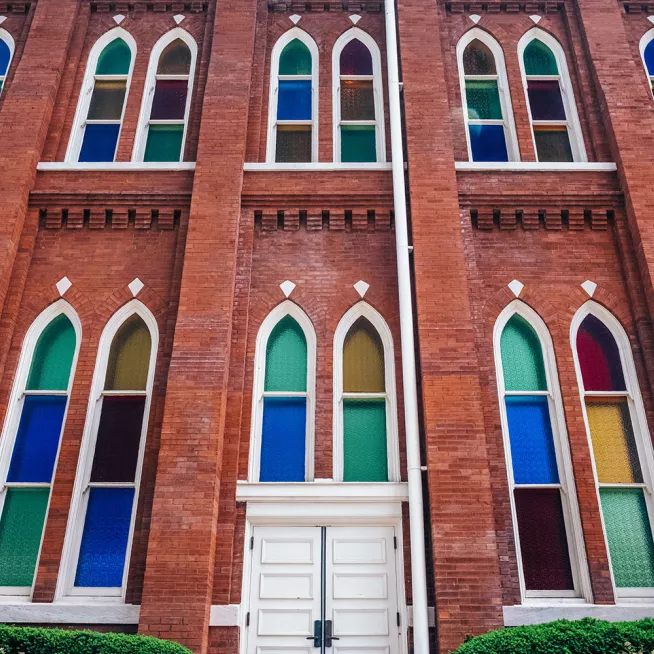Breadcrumb
Exhibition of Gilded Age Sculpture Examines the Sculpture Examines the Intersecting Careers and Legacy of Augustus Saint-Gaudens and Daniel Chester French
Monuments and Myths: The America of Sculptors Augustus Saint-Gaudens and Daniel Chester French.
March 1–May 27, 2024
NASHVILLE, TN - The Frist Art Museum presents Monuments and Myths: The America of Sculptors Augustus Saint-Gaudens and Daniel Chester French, the first major exhibition devoted to the intersecting careers of the two foremost American sculptors of the Gilded Age. Co-organized by the American Federation of Arts, Chesterwood, and the Saint-Gaudens Memorial in partnership with the Saint-Gaudens National Historical Park, the exhibition will be on view in the Frist’s Upper-Level Galleries from March 1 through May 27, 2024.
Augustus Saint-Gaudens (1848–1907) and Daniel Chester French (1850–1931) were the preeminent American sculptors of the late nineteenth and early twentieth centuries. Saint-Gaudens was born in Dublin, Ireland and immigrated to New York as an infant. French was born in Exeter, New Hampshire. After coming of age in Civil War America and training in Europe, both artists returned to the United States in a moment when sculpture had immense power to shape the visual and intellectual landscape of the nation during a period of rapid industrial growth and developing sociopolitical structures.
As friendly rivals, they transformed American sculpture, producing dozens of the nation’s most recognizable public artworks—from Saint-Gaudens’s Diana atop New York City’s Madison Square Garden to French’s Seated Abraham Lincoln in the Lincoln Memorial, Washington, DC. With an aesthetic of formal elegance, they contributed to the creation of a national identity rooted in conceptions of liberty, grandeur, and common cause.
Monuments and Myths is the first exhibition to explore the artists’ intersecting careers and features approximately seventy sculptures, models, maquettes, and more drawn from the collections of the two artists’ historic homes, the Saint-Gaudens National Historical Park and French’s Chesterwood. While learning about the lives and careers of both artists, guests will be offered an expansive narrative that reflects the multifaceted stories embedded in the art. “As we collectively refocus our attention on the role and meaning of historic monuments, it is a timely moment to ponder the continuing power of this work and to examine how it has shaped—and continues to inform—our understanding of the United States,” notes Frist Art Museum senior curator Katie Delmez.
Organized thematically into five sections, the exhibition begins with an overview of the artists’ thriving studio practices in rural New England, both of which were dynamic spaces of creativity, education, and exchange. The section, Sculpture for Civic Spaces, examines the monument-building boom of the Reconstruction era when private patrons and civic groups aggressively commissioned public artworks for rapidly developing cities and memorial landscapes. The projects aimed to influence and unify Americans by illustrating perceived national achievement and shared values following the Civil War. Saint-Gaudens and French were well suited to meet the demand with aesthetics that fused modern naturalism and classically inspired solemness.
Both artists were also highly sought-after portraitists working in bust formats as well as low-relief panels. As demonstrated in the section Society Portraits, their innovative style helped progress the genre beyond conservative traditions and the work itself was mutually beneficial for the careers and social status of both the artists and their subjects.
Between 1860 and 1920, Americans experienced the Civil War, World War I, and the influenza epidemic of 1918. The section Modern Mourning showcases French’s and Saint-Gaudens’s funerary monuments and looks at how, during this extended period of unfathomable human loss, the two sculptors’ evocations of beauty and mystery played a vital role in shaping evolving attitudes toward death, grief, and memorialization.
Many of the United States’ most recognizable and controversial monuments emerged from the nation’s complicated efforts to make sense of the Civil War. The final section, Lincoln and the Civil War Memory demonstrates how public sculpture served as a fertile ground for honoring the dead and cultivating tenuous bonds of national unity; it includes French’s Abraham Lincoln for the Lincoln Memorial as well as examples derived from Saint-Gaudens’s Robert Gould Shaw and the 54th Massachusetts Regiment Memorial. Both artists’ portraits of Lincoln highlight his seriousness and humanity and have become central markers in the United States’ memorial landscape.
Saint-Gaudens and French were dependent on commissions from those in political or cultural power, and the narratives of an ascendant nation conveyed by the works in Monuments and Myths reflect only a partial vision of the United States. “The works on view in the exhibition have the potential for multiple interpretations in relation to contested histories, encouraging us to question the stories that public art tells and to explore what—and whose—histories remain hidden from view,” writes Delmez.
Exhibition Publication
The exhibition is accompanied by a new scholarly catalogue with contributions by Renee Ater, Phil Deloria, Donna Hassler and Dana Pilson, Kelvin Parnell Jr., Thayer Tolles, and Charles F. Sams III.
Exhibition Tour
Jule Collins Smith Museum of Fine Art, Auburn University, Auburn, AL: May 30, 2023 – August 7, 2023
Frist Art Museum, Nashville, TN March 1 – May 27, 2023
Michener Art Museum, Doylestown, PA June 29, 2024 – January 5, 2025
Brunnier Art Museum, University Museums, Iowa State University: February 8 – May 18, 2025
Opening Program
Thursday, February 29
A Peek Behind the Curtain: The Making of Monuments and Myths
Presented by Dana Pilson, curatorial researcher and collections coordinator, Chesterwood
6:30 p.m.
Auditorium
Free; first come, first seated
Dana Pilson, Chesterwood curatorial researcher and co-curator of Monuments and Myths, introduces the exhibition and highlights some of the most important works by the two artists. She will also present an illustrated visit “behind the scenes” showing how the exhibition came together, from the initial idea to the selection of objects, conservation and photography of works, and finally packing, shipping, and installation.
Dana Pilson is the curatorial researcher and collections coordinator at Chesterwood, the historic home, studio, and gardens of American sculptor Daniel Chester French, in Stockbridge, Massachusetts, where she has been working on curatorial and research projects for over ten years. She is a member of the curatorial team for Monuments and Myths. She and Chesterwood director emerita Donna Hassler contributed an essay to the exhibition catalogue focusing on the studio practices and domestic lives of Saint-Gaudens and French. In addition, she is a cowriter with Metropolitan Museum of Art sculpture curator Thayer Tolles of the comprehensive timeline that charts the many parallels between the lives and careers of the two sculptors.
Exhibition Credit
This exhibition is co-organized by the American Federation of Arts, Chesterwood, a site of the National Trust for Historic Preservation, and the Saint-Gaudens Memorial in partnership with the Saint-Gaudens National Historical Park. Major support for the publication has been provided by the Wyeth Foundation for American Art. Support for the exhibition and publication has been provided by the Gladys Krieble Delmas Foundation.
About the American Federation of Arts
The American Federation of Arts is the leader in traveling exhibitions internationally. A nonprofit organization founded in 1909, the AFA is dedicated to enriching the public’s experience and understanding of the visual arts through organizing and touring art exhibitions for presentation in museums around the world, publishing exhibition catalogues featuring important scholarly research, and developing educational programs.
About Chesterwood
Chesterwood, a Site of the National Trust for Historic Preservation since 1969, is the former summer home, studio, and gardens of American sculptor Daniel Chester French in Stockbridge, Massachusetts, where he lived during the months of May through October from 1897 to 1931. The site comprises a 122-acre landscape with mountain views, as well as formal gardens and woodland trails designed by the sculptor. Chesterwood displays a collection of French’s original sculptures throughout the French family Residence, the sculptor’s Studio, and newly expanded exhibition galleries. Public appreciation of sculpture is fostered through an annual contemporary sculpture exhibition, artist residencies, and workshops. Chesterwood is recognized as both a National Historic Landmark and a Massachusetts Historic Landmark.
About Saint-Gaudens National Historical Park
Saint-Gaudens National Historical Park in Cornish, New Hampshire, preserves the home, gardens, and studios of Augustus Saint-Gaudens. This was his summer residence from 1885 to 1897, his permanent home from 1900 until his death in 1907, and the center of the Cornish Art Colony. Original sculptures are on exhibit, along with reproductions of his greatest masterpieces. The estate was declared a National Historic Landmark in 1962, and in 1964 Congress authorized the Saint-Gaudens National Historical Park as a unit of the National Park Service.
Supporter Acknowledgment
Supported in part by the Sandra Schatten Foundation
The Frist Art Museum is supported in part by The Frist Foundation, Metro Arts, the Tennessee Arts Commission, and the National Endowment for the Arts.
###







